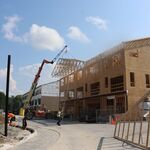T
tudararms
Guest
"No, but I don't think we should be making ourselves into Paris, or London or New York by copying say their planning policies, for example. The core of those cities are fundamentally different from Toronto contextually speaking."
...but isn't Paris fundamentally different from London? Montreal from San Francisco? New York from New Orleans? Don't get stuck on the Paris/NYC/London examples. I only use them because they're the cities I know best. My basic points here are:
1. These cities know how to build tourist attractions, or in other words effectively exploit (I prefer the French term, 'mettre en valeur') the historic, cultural, commercial or merely curious sites of their cities to visitors and residents, because they have a clear knowledge of and confidence in who and what they are, even if only in perception rather than in reality, strictly speaking.
2. The people have a fundamental respect for and belief in their city that informs both the private and public sectors, such that second rate is not accepted as good enough. This shows in the quality of all sorts of urban issues we talk about on this forum.
3. Although I agree that the specific and unique contexts of these cities differs, the fundamental nature of the relationship between the city and its people, and the city and its hinterland, are similar in these ways.
"Besides, Toronto has our own tradition to maintain - in fact, this sort of "small-mindedness" (others would prefer to call it humility) is very Prebyterian, reflective of our history. Isn't that something you advocated on many occasions?"
Absolutely I do, but I think we need an accurate and comprehensive understanding of our history, which is not easy when you consider how thoroughly neglected and undervalued it is, from the highest levels of our government to our very school system. On this point, however, I would submit that our colonial and victorian ancestors did not have 'humility' in quite the same way you imply. They were in fact a very tenacious, proud, some may say arrogant, and self-aware people. To put them in context, it is important to understand that those who settled and populated this city, and the province in general, were in fact fugitives and refugees fleeing for their life and from everything they knew because of what they believed in, to start their lives over again in a fairly remote and undeveloped place. Barely on their feet again, they then faced invasion and war to defend this choice. When they rebuilt once again from this devastation the buildings, monuments and institutions they would create, that would endure up to the post-war period and even today in some cases, hardly speak of humility or a tentative sense of self.
...but isn't Paris fundamentally different from London? Montreal from San Francisco? New York from New Orleans? Don't get stuck on the Paris/NYC/London examples. I only use them because they're the cities I know best. My basic points here are:
1. These cities know how to build tourist attractions, or in other words effectively exploit (I prefer the French term, 'mettre en valeur') the historic, cultural, commercial or merely curious sites of their cities to visitors and residents, because they have a clear knowledge of and confidence in who and what they are, even if only in perception rather than in reality, strictly speaking.
2. The people have a fundamental respect for and belief in their city that informs both the private and public sectors, such that second rate is not accepted as good enough. This shows in the quality of all sorts of urban issues we talk about on this forum.
3. Although I agree that the specific and unique contexts of these cities differs, the fundamental nature of the relationship between the city and its people, and the city and its hinterland, are similar in these ways.
"Besides, Toronto has our own tradition to maintain - in fact, this sort of "small-mindedness" (others would prefer to call it humility) is very Prebyterian, reflective of our history. Isn't that something you advocated on many occasions?"
Absolutely I do, but I think we need an accurate and comprehensive understanding of our history, which is not easy when you consider how thoroughly neglected and undervalued it is, from the highest levels of our government to our very school system. On this point, however, I would submit that our colonial and victorian ancestors did not have 'humility' in quite the same way you imply. They were in fact a very tenacious, proud, some may say arrogant, and self-aware people. To put them in context, it is important to understand that those who settled and populated this city, and the province in general, were in fact fugitives and refugees fleeing for their life and from everything they knew because of what they believed in, to start their lives over again in a fairly remote and undeveloped place. Barely on their feet again, they then faced invasion and war to defend this choice. When they rebuilt once again from this devastation the buildings, monuments and institutions they would create, that would endure up to the post-war period and even today in some cases, hardly speak of humility or a tentative sense of self.





